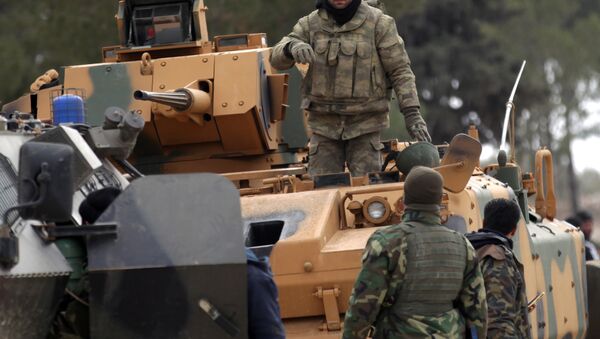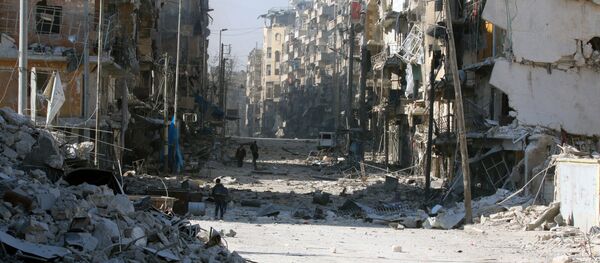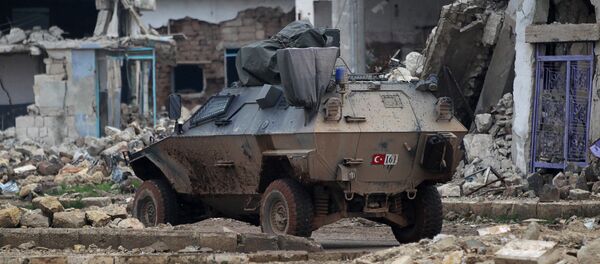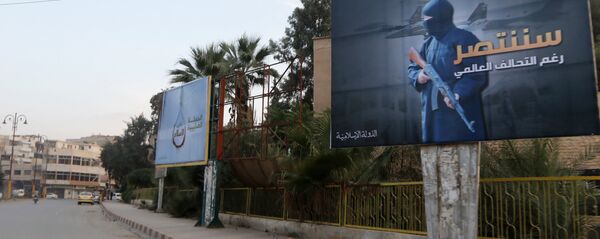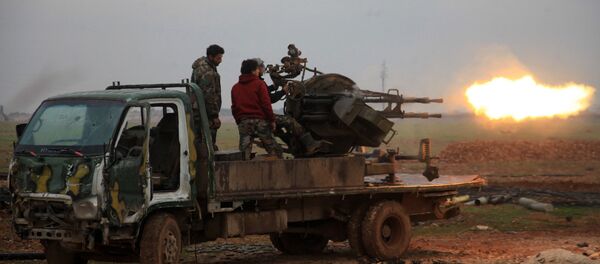However later on Monday, Ilnur Cevik, Chief Adviser to the Turkish president, said that Turkey plans to end its operation in Syria after capturing the northern city of Manbij from Kurdish militants. Speaking at a conference on Russian-Turkish relations, he pointed out that around 85 percent of Manbij and its outskirts are controlled by the Kurdistan Workers' Party (PKK), viewed by Ankara as a terrorist organization.
Sputnik Turkiye sat down with Istanbul-based security analyst Metin Gurcan to discuss the future of the Turkish operation in Syria and the further developments in the north of Syria.
"After the incident on November 24, 2015, when the Russian SU-24 attack aircraft was shot down by a Turkish fighter jet, Turkey was left out of the processes going on on the Syrian territory. However thanks to the Euphrates Shield operation, it was able to get back into the fold," he told Sputnik.
"Thanks to the operation and its involvement in the developments in the country, Turkey was able to play a more serious role at the negotiation table, and other players in the region entered into a dialogue with it," he added.
According to Gurcan, the developments in the north of Syria will considerably speed up in the beginning of March, as President Trump has ordered the Pentagon to devise a plan A and plan B on its further actions in Syria by February 28. Therefore, in the first two weeks of March we should expect increased activity from the US leadership, the analyst suggested.
Commenting on the operation to liberate the Syrian city of Raqqa, the de facto capital of the Daesh militants, Metin Gurcan pointed out that there is a serious need for the tank troops, motorized armored vehicles, missiles and grenade launchers for the operation.
"Kurdish People's Protection Units (YPG) do not have this type of equipment in their possession. They have only armored vehicles," he told Sputnik.
He further said that he often reads through the comments of various experts who compare the upcoming operation on the liberation of Raqqa with that of liberation of Kobani in the Aleppo Governorate. These comparisons are erroneous, he said. The Kurdish YPG forces then were acting on the defensive and were comprised of only small numbers.
The YPG forces now are on the offensive in the front line, he said. In such conditions Daesh will be able to eliminate their light armored vehicles within three days and destroy their line of offense, he said.
Metin Gurcan further suggested that the Raqqa offensive might therefore be delayed.
"In its negotiations with the US, Turkey is insisting on the exclusion of the Kurdish YPG forces from the operation and on taking under control the Arab forces of the Syrian Democratic Forces," he told Sputnik.
He further explained that Ankara is trying to carry out this operation with the support of the Free Syrian Army. However the US, he said, is not that eager to agree as it has serious concerns over the combat ability and reliability of the Free Syrian Army fighters.
Moreover, he noted, they don't have enough infantry fighters. And the question is how to make up for this shortfall. It might be solved either by Turkey sending special forces into Raqqa, which will take a minimum of one year, rising to up to 3.5 years, or by Kurdish Peshmerga forces relocating there from the north of Iraq.
Gurcan also noted that Turkey is trying to make as much of an impact in the north of Syria with as few losses as possible. It is not an easy strategy, he said, which requires much balancing between the key players in the regions, which are Syria, Russia and the US, those, who face each other off on the ground.
He further explained, that with regards to the operation on the liberation of Raqqa, Turkey suggests advancing from the town of Tell Abyad to the east of the Euphrates, through Kobani and further towards Raqqa. It also means setting up a 30 kilometer logistic route towards Turkey, which de facto implies the city of Kobani de falls under the control of Turkey.
While the US is not in favor of such a scenario, he said, it is the most rational plan. The US, in its turn, suggests advancing towards Raqqa from al-Bab, the analyst said, adding that this was a difficult route due to the terrain.
"Turkey is trying to get the maximum advantage at the minimum expense. However such a strategy is fraught with considerable risks," he therefore concluded.
Never miss a story again — sign up to our Telegram channel and we'll keep you up to speed!

